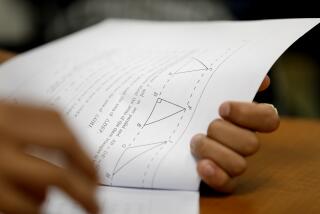My Dog Ate My Argument
- Share via
At the turn of the century, Edward Bok, the powerful editor of the Ladies’ Home Journal, launched an impassioned campaign against homework, arguing that it crippled the physical, mental and emotional health of children. He branded it “a national crime at the feet of American parents.” The U.S. commissioner of education agreed, telling Congress that homework was “a prolific source of abuse.” A year later, in 1901, California -- along with dozens of local school districts across the country -- banned homework altogether for any public school child under 15.
Today, concern about homework is again reaching a fever pitch. The most recent round is prompted by reports since the mid-1990s that the homework load is higher than ever. The New York Times, for instance, reported that children are “homework-bound” by the “gross tonnage” of homework. USA Today reported that the nation was in a period of “homework intensification.”
These homework wars are a familiar part of the nation’s ongoing debate over education. Since Bok’s day, the pendulum has swung back and forth. One generation of educators worries that students are not getting enough of it (this happened in the 1950s and 1980s). The next generation worries that children are overworked and overscheduled and that their social development is being ignored.
But today’s war, like those that preceded it, is based on several false notions. The first is that there’s a huge and growing homework burden. That perception is completely contrary to the evidence.
Two new studies -- one by us and one by Tom Loveless of the Brookings Institution -- make clear that the great majority of American children at all ages do only moderate amounts of homework. When asked, for instance, how much homework they did “yesterday,” most children across the country -- in elementary, middle and high school grades -- said they do no more than an hour.
And this is not unique to our times. It turns out there was no “golden age” when most American kids, willingly or unwillingly, did lots of homework. Since World War II, the proportion of high school students spending a substantial amount of time studying -- more than two hours nightly -- has generally varied from 7% to 13%. Homework amounts peaked briefly during the decade after Sputnik but, even then, not more than one high school student in four studied more than two hours a night. Little homework is the norm and has always been the norm.
Second, it’s not true that most parents object to homework. Today, as in the past, most parents strongly support it. A Public Agenda poll in 2000 found that only 10% of parents thought their children had too much homework, while 25% thought they had too little and 64% thought the amount was about right.
A vocal minority can often manage to get the media’s attention -- as Bok did, and as happened again in the 1930s, when homework was branded a “sin against childhood” by opponents. But it’s just that: a noisy minority, not a representative sample of the population.
Third, and most important, the homework wars -- this time as in the past -- are narrowly centered on the quantity that is being assigned: How much is too much, and how much is too little? Very little effort goes into figuring out how to improve the quality and value of the homework that teachers assign.
In our view, homework is the prime window into the school for parents to see, understand and connect with the academic mission of the teachers. It is the primary area in which children, parents and schools interact on a daily basis. Yet it gets less systematic thought and attention than any other key component of education. Other than the admonition that kids should do more of it, we pay almost no attention to how to improve its design and content. Nor do we do much to prepare teachers to use and evaluate homework, to hold administrators accountable for monitoring the homework load or to cultivate parents’ collaboration. Homework remains an orphan child of the educational excellence movement.
The debate over homework must be redirected. Moral exhortation -- accusing our kids and parents of being lazy, comparing them unfavorably with their counterparts in Japan (as in the 1980s) or Russia (as in the 1950s) -- just doesn’t seem to have much effect in changing long-term homework trends.
After half a century of failure to increase student buy-in, it’s time to rethink how to make homework a more valued part of the pedagogic process. In addition to promoting academic achievement, homework can inculcate habits of self-discipline and independent study and can help inform parents about the educational agenda of their school. We must find ways to make homework an interesting and challenging educational experience for students, instead of the uniform, seat-bound, memorization-focused solo exercise it has been. Otherwise, all our talk about high standards and improving student achievement will run up against the same roadblock that has stymied the pursuit of educational excellence in the past.
More to Read
Sign up for Essential California
The most important California stories and recommendations in your inbox every morning.
You may occasionally receive promotional content from the Los Angeles Times.









